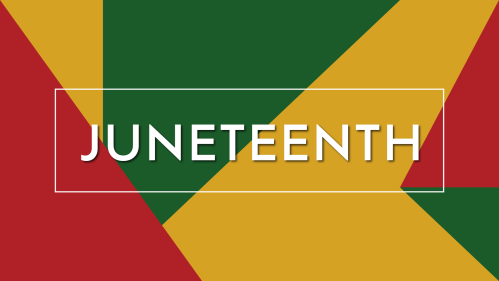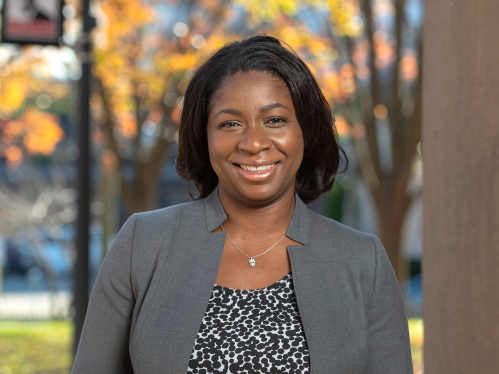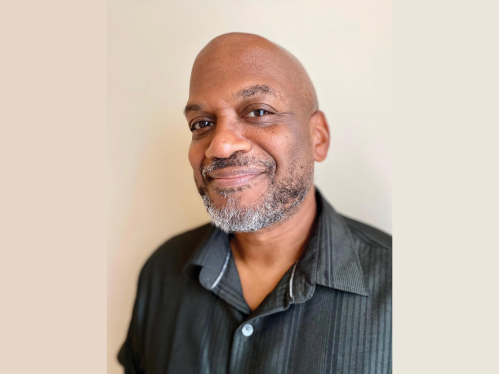
Rutgers Commemorates Juneteenth

Juneteenth is being widely celebrated across the country a year after President Biden signed a law making it a federal holiday. We asked faculty across Rutgers why it's important to mark this day and what are appropriate ways to honor the holiday that commemorates the end of slavery in the United States.
What Juneteenth Calls Us to Remember
Jonathan Holloway
Rutgers University President and University Professor
Recognizing Juneteenth is a somber act of remembrance; a declaration that this country should continue the hard work of becoming the beacon of liberty and righteous independence that it claims to be. Juneteenth, the federally recognized holiday that honors the emancipation of enslaved people, is a reminder that freedom is incomplete if it is based on anything less than the truth. Taking a close look at the history of “The Star-Spangled Banner” helps illuminate the importance of a holiday like Juneteenth.
In September 1814, Francis Scott Key wrote a poem titled “The Defence of Fort M’Henry,” when he saw the United States flag defiantly flying the morning after British warships spent a night bombarding Baltimore’s Fort McHenry. Over a century later, that poem would officially become this country’s national anthem. It is a song that speaks to resilience and hails the freedom and bravery that are the bedrock of this country’s values. This much is familiar to those who claim to know a bit of our nation’s history, but like most national founding stories, we have arrived at the familiar through a commitment to forgetting.
Few people know, for example, that there are four stanzas in the original poem. The second, third and fourth stanzas are more martial than the first, aggressively criticizing external threats to independence, and all end similarly, hailing the flag and its representation of the “land of the free and the home of the brave.” But freedom for who? Who in this country is brave?
In 1861, poet Oliver Wendell Holmes added an unofficial fifth stanza to Key’s original four. This verse, written in the dawning moments of the Civil War, spoke about an internal threat–southern secessionists–and looked forward to a day when there was no irony in the poem’s final lines:
When our land is illum'd with Liberty's smile,
If a foe from within strike a blow at her glory,
Down, down, with the traitor that dares to defile
The flag of her stars and the page of her story!
By the millions unchain'd who our birthright have gained
We will keep her bright blazon forever unstained!
And the Star-Spangled Banner in triumph shall wave
While the land of the free is the home of the brave.
Holmes’s stanza is an invocation of possibility, a harkening to that moment when the United States truly would become the free land that it claims to be. What is implicit in this stanza, and what Juneteenth celebrants understand, is that much work remains in order to realize the anthem’s declaration.
In 2022, we remain hard at work on this task. The brave among us recognize that being honest about this nation’s history is hard, but being committed to telling a robust history that recognizes our triumphs and our shortcomings is a deeply patriotic act. After all, how can we appreciate our victories – how can we celebrate with integrity our excellence – without knowing about those occasions when we have fallen short?

“Free-ish Since 1865”: Juneteenth, a Call to Fight for Freedom
Enobong Hannah Branch
Senior Vice President for Equity and Professor of Sociology
America, through our monuments and celebrations, has had a way, historically and still at present, of hiding the contradictions of our democracy. In the late 1800s, at the same time that the Statue of Liberty declared America as a beacon of hope and freedom to the world, the south rejected Reconstruction and progress for the formerly enslaved. Through means both violent and nonviolent, slavery was reestablished by another name.
State and local statutes known as Jim Crow laws legalized racial segregation. Sharecropping, a system of debt peonage, tied freedmen again to the land. Convict leasing – the state practice of leasing prisoners’ labor – provided perverse incentives to criminalize Black behavior. Movement itself became punishable through vagrancy laws. The sanctioned practice of lynching – racialized terror – highlighted most plainly the limits of freedom, reasserting the infamous words from the Dred Scott decision that Black Americans had “no rights which the white man was bound to respect,” even their very life.
While Juneteenth is a commemoration of the Emancipation of enslaved Black Americans, which was proclaimed on January 1, 1863. The day itself, June 19, 1865, reflects how long it took for enslaved Black Americans in Galveston, Texas to learn they were free. We should commemorate it by taking up the fight to preserve freedom and combat erasure today.
The anger for some at the removal of Confederate monuments, the prominent display of the Confederate flag during the January 6 insurrection, serve as reminders of the vulnerability of the democracy project. We have a responsibility to prevent the whitewashing of a bloody history. Monuments, flags and federal holidays are symbols, calls to remember and to celebrate. They convey who is valued, who belongs and who is excluded. On Juneteenth, I urge you to take up the fight to make a more perfect union: register folks to vote, educate yourself, do not erase or diminish the divisions of our past, ensure we don’t repeat its mistakes.

How Businesses Can Ethically Acknowledge Juneteenth
Yla Eason
Assistant Professor of Professional Practice
Rutgers Business School-Newark and New Brunswick
The celebration of Juneteenth was born out of two occurrences – the ending of slavery and the final announcement of such. It was also born out of an insidious bit of treachery to withhold that unannounced freedom information from the enslaved for two years after "Emancipation" so that plantation and farm owners could continue to harvest their crops and benefit from this undeserved free labor. It should be categorized as an employer theft of services case.
Fast forward to today when a major retailer takes an ice cream flavor sold in its stores by a Black-owned business, copies its red velvet flavor, cuts no licensing deal with the owners, renames the product after the freedom event of their ancestors and proudly takes credit for their cultural celebration concept. Walmart did not appropriate Juneteenth, they just ripped off “Cremelicous.”
How can brands/companies get involved without appropriating or profiting in an irresponsible manner? Let’s start with making sure that the people who profit from the event or celebration are the people whom the event is meant to acknowledge. It’s a simple formula; if it’s a Black event, make sure that Black creatives, inventors and businesses will make money from it. Empower and enrich the Black people who will be buying the products or services. Let’s honor Black labor that has never been compensated for the years spent working to build the commerce of tobacco and cotton that grew the country to its grandeur and wealth today. Make sure the progeny of those exploited people “eat.”
Rather than take from the community, let’s have businesses give back by adopting the 15% Pledge. As the creator of this pledge says: “Black people make up 15% of the U.S. population. So, we asked businesses to dedicate 15% of their shelf space to Black-owned brands.” That’s the proper way for brands to celebrate Juneteenth.




Let’s honor Black labor that has never been compensated for the years spent working to build the commerce of tobacco and cotton that grew the country to its grandeur and wealth today.
Yla Eason
Rutgers Business School-Newark and New Brunswick
The Conversations We Need on Juneteenth
David A. Love
Teaching Instructor of Journalism and Media Studies
School of Communication and Information
Rutgers-New Brunswick
Juneteenth is a perfect occasion to reflect on racial injustices past and present and determine whether America – after more than four centuries – will ever become a place that embraces Black freedom, safety and self-determination. More than ever, America must hold these conversations now.
From its origins in Texas, Juneteenth spread to other states and Mexico to become a Black Independence Day from enslavement. The holiday was federalized at a time when the country screamed out for racial justice during the racial reckoning of 2020 – the aftermath of the police murder of George Floyd in Minneapolis, the nationwide and global protests against police violence and calls for an end to systemic racism.
Cries for justice and equality face a reactionary backlash from those who would erase the historical record and ban the teaching of slavery, segregation and institutional racism. If we hide the crimes, we evade accountability. When we mask the problem, we avoid finding solutions.
As a Black professor at Rutgers, I am uniquely aware of the conversations regarding the past, present and future that Juneteenth opens for us. An institution built by the labor and sale of enslaved Africans, it is certain the university was not originally intended for Black students, much less Black faculty. Understanding this history informs our present sense of responsibility for repairing the damage inflicted on New Jersey communities of color and the students raised in these communities.
If nothing else, Juneteenth reminds us of the precarious and conditional nature of freedom in America if you’re Black. After all, Black Texans did not learn of their liberation until two months after the end of the Civil War, and two years after President Lincoln signed the Emancipation Proclamation. Despite successive constitutional amendments and civil rights laws, freedom has remained elusive for their descendants. And even now, racial violence and a rollback of basic rights and constitutional protections threaten the promise of a multiracial democracy never fully realized.
These are the conversations we must have on Juneteenth, at a time when society has the greatest need for dialogue.

Drawing on the Lessons of Juneteenth to Enrich the History We Teach
Lacey Hunter
Instructor, African American and African Studies
Rutgers-Newark
The national recognition of Juneteenth in the United States makes a powerful statement to the nation, especially its youth. It creates possibility for more meaningful civic dialogue and allows us to tell a more holistic story about our country – one that emphasizes balance rather than fragmentation. Commemorating Juneteenth gives us permission to lay aside some of the harmful myths and legends that discourage hard questions and tough conversations in our society. More than this, celebration of this day challenges us to embrace the sobering complexity of U.S. American history.
Including Juneteenth and its storytelling traditions in primary, secondary and post-secondary schools means we will need to continue addressing slavery and its legacies in the United States long after legal abolition. As we enrich the history we teach our young people, we can use the lessons of Juneteenth to demonstrate how individuals and communities work to create societies they know are possible, even when they face significant challenges. When we provide full and rich histories in this country, we prepare young people to have better conversations in their classrooms and we support their ability to ask more critical questions about the world around them.
For the earliest communities of freed Black people celebrating Juneteenth, remembering their bondage and celebrating their freedom affirmed their humanity and their value as a part of the U.S. American civic body. In this tradition, we can use the nation’s recognition of Juneteenth to engage in community dialogue that reflects on the meaning of freedom now – particularly for those whose freedom is still conditional. Most importantly, however, we can draw on the lessons Juneteenth offers us to develop practices that will help us build more socially just environments for ourselves and our youth. If, as a society, we want to gift young people with something more than a symbolic gesture in the national recognition of Juneteenth, we must do more than commemorate. Together, we must work to show American youth how important it is to make space for one another and give them the tools to do the same.

Juneteenth Reminds Us the Work Toward Full Scale Liberation Continues
Keith Green
Associate Professor of English
Director, Africana Studies
Rutgers-Camden
The rough outlines of Juneteenth’s origins are likely familiar to many. On June 19, 1865, General George Granger arrived in Galveston, Texas and delivered the news that effective immediately the enslaved people of Texas were now free. Unfortunately, the delivery of this news came two and a half years after the 1863 Emancipation Proclamation had already manumitted enslaved African Americans in the U.S. south. Freedom was finally coming to the approximately 200,000 African Americans held in bondage in Texas, but it was coming belatedly.
What is less publicized is that Granger’s General Order 3 also stated: “The freedmen are advised to remain quietly at their present homes and work for wages.” The fact that African American Texans were now free did not mean an automatic change in their circumstances, and the terms of their freedom actually encouraged dependence on the people that had exploited their labor for years. This clause reveals one of the central ironies and lessons of Juneteenth: freedom is not the same as liberty. The work of full-scale liberation is a continuing and uncertain process that requires radical acts of faith, but also real and widespread structural change.
In our current moment, we see so many signs that the structure has not changed. Aside from the obvious and well-publicized cases of Black murder at the hands of law enforcement and the judicial system, coordinated attacks have been made against important Civil Rights legislation and the ability of citizens’ votes to be counted. In so many ways, we are being encouraged to “remain quiet” and “collect wages” while the real work of liberation remains to be done.
But Juneteenth reminds us that until all of us are free, none of us are free. It is a day that should compel every human being to imagine and work towards a world where true liberty, not just state-sanctioned emancipation, is a reality for all.



